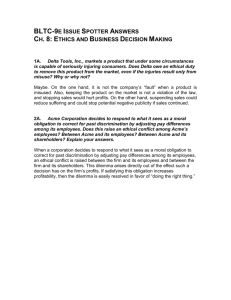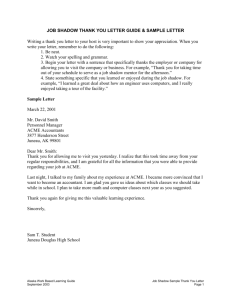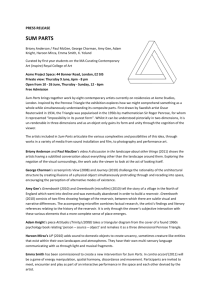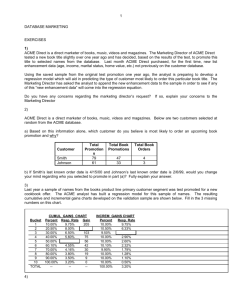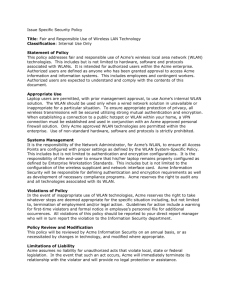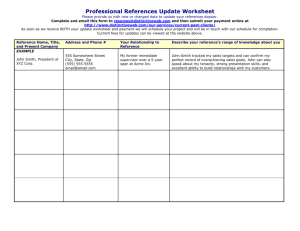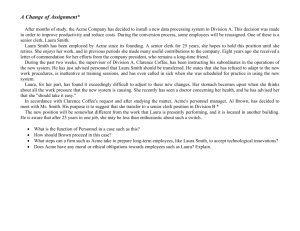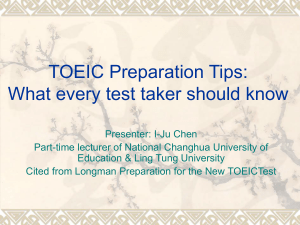C. Maillard, Data management of ACME trials
advertisement
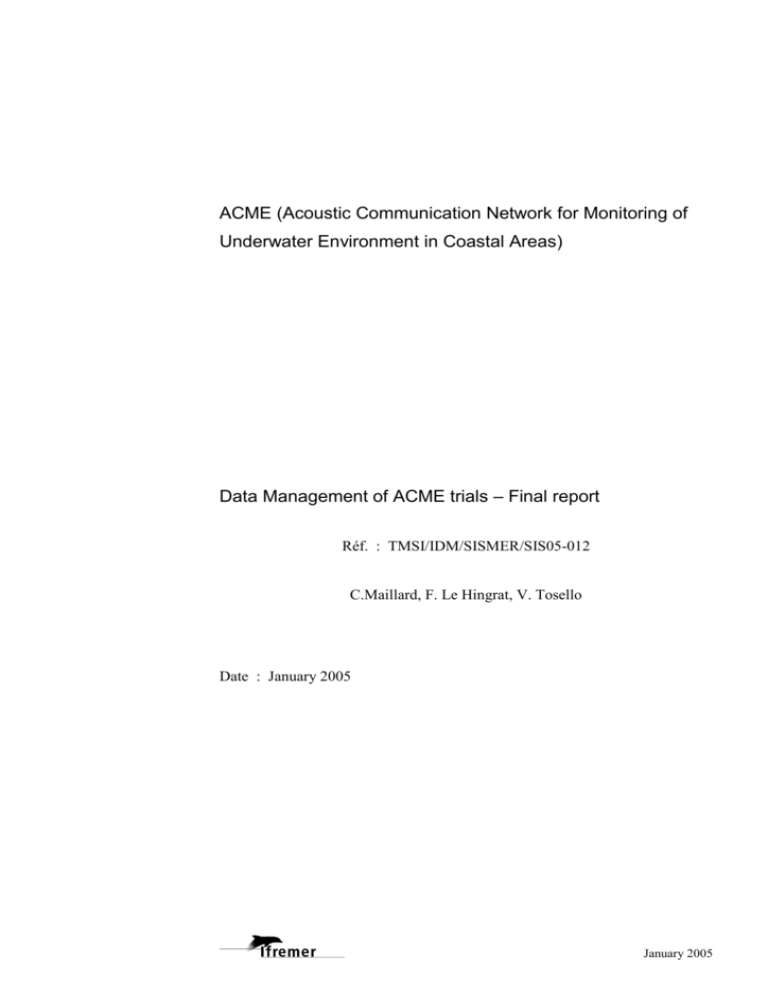
ACME (Acoustic Communication Network for Monitoring of Underwater Environment in Coastal Areas) Data Management of ACME trials – Final report Réf. : TMSI/IDM/SISMER/SIS05-012 C.Maillard, F. Le Hingrat, V. Tosello Date : January 2005 January 2005 sommaire 1. Introduction.............................................................................. 3 2. ACME cruises .......................................................................... 3 2.1. First ACME cruise : Westerschelde, June 2001 .......................................... 3 2.1.1. Objectives ....................................................................................... 3 2.1.2. Data types ...................................................................................... 4 2.2. Second ACME cruise : Bay of Douarnenez, September 2002 .................... 4 2.2.1. Objectives ....................................................................................... 4 2.2.2. Data types ...................................................................................... 5 3. Data Archiving ......................................................................... 5 4. Data dissemination .................................................................. 6 5. WWW server ............................................................................. 6 Data Management of ACME trials – Final report 3 1. Introduction The EU fifth-framework project ACME concerns the continuous monitoring of the coastal underwater environment in areas such as shipping lanes and fishing areas. ACME aims at the design of robust communication and protocol algorithms, which will be implemented and tested in a prototype of a shallowwater acoustic communication network capable of conveying data from several underwater sensors to a central node. Such a non-invasive fully acoustic network will be new in Europe. A major interest in ACME will be to produce data sets of good quality and well organised for evaluating the progresses made in underwater communication in coastal areas. The data management objective is to insure safeguarding and easy but controlled access to the data collected. The methodologoly is to safegard the data sets in a perennial system with indexation in WWW catalogue. 2. ACME cruises The project observations strategy includes two cruises: one in the Wester Schelde and one in the Bay of Douarnenez. Acoustic data will be collected and accompanied by classical environmental observations. 2.1. First ACME cruise : Westerschelde, June 2001 2.1.1. Objectives The first ACME sea trials took place in Westerschelde, in an early phase of the project. The initial idea of such early trials was to get a feeling for the difficulties one can expect with underwater communication in shipping lanes. As part of the trial an assessment of the performance of the standard modems (ORCA MATS 200) would be made. The results of the trial would guide in the further development of suitable signal processing schemes and necessary adaptations of the hardware, and would provide valuable experience for further sea trials. This trial had a fourfold purpose, described in the Measurement Plan : Data Management of ACME trials – Final report 4 1. To determine characteristics of the environment in the Westerschelde shipping lane that influence the performance of an Underwater Acoustic Communication link (noise spectra, frequency shifts and spreading, time spreading). 2. To collect environmental data (sound speed profiles, bathymetry) for sound propagation modelling in the laboratory. 3. To determine the usability and limitations of the existing modems in the Westerschelde. 4. To transmit and record a set of new communication signals for laboratory analysis after the trial. 2.1.2. Data types The data types of this cruise are: - Single-beam echosounding, - CTD stations, - Subsurface meas. underway (T,S), - Other physical oceanographic meas, - Routine standard measurements. The data of this cruise are described in the on line catalogue on the website http://www.ifremer.fr/sismer/program/acme/. 2.2. Second ACME cruise : Bay of Douarnenez, September 2002 2.2.1. Objectives The second ACME sea trial was carried out halfway the ACME project, in the Bay of Douarnenez, France. Whereas the first ACME trials focussed on pointto-point communication schemes and the ORCA modem performance in crowded shipping lanes, the second sea trials specifically aimed at the network aspects. The minimum objectives for these trials were: 1. To verify the functioning of network protocols with broadcast and simultaneous CDMA experiments. Data Management of ACME trials – Final report 5 2. To verify the functioning of protocols involving a relay node. Moreover, desirable extra objectives were: 3. The establishment of a high data rate (BPSK) point-to-point communication link. 4. To determine characteristics of the Bay that affect the quality of an underwater acoustic communication link, e.g. timespreading, frequency spreading, ambient noise. 5. To collect environmental data such as sound speed profiles, bathymetries etc. for sound propagation modelling in the laboratory. 2.2.2. Data types The data types of this cruise are: - Single-beam echosounding, - CTD stations, - Other physical oceanographic meas, - Routine standard measurements. The data of this cruise are described in the on line catalogue on the website http://www.ifremer.fr/sismer/program/acme/. 3. Data Archiving The data and meta data of the first ACME cruise in Westerschelde (North Sea) and of the second ACME cruise in Bay of Douarnenez (Brittany, France) have been safeguarded and loaded in the ACME data management server on internet. The cruise summary reports (ROSCOP/CSR meta-data) and the data summary report (EDMED meta-data) are loaded in the SISMER RDBS server and edited on line through the dynamic editor. The CTD data have been safeguarded, reformatted at the international MEDATLAS (auto descriptive ASCII), checked for quality according to the IOC methodology and integrated for final archiving in the SISMER CTD database. Data Management of ACME trials – Final report 6 The other data : acoustic data, bathymetry, sound speed profiles, weather report, figures (tide, configurations) and photographs are safeguarded at the original format. The metadata have been also safeguarded at the original format : word documents relevant to the ACME sea trials (cruise report, formats description, overview of environmental data collected, measurement plan, logbook for the bridge, logbook for the acoustic experiments performed). 4. Data dissemination TNO, as data management coordinator, agreed that : 1) all the documentation transmitted to IFREMER, including format description is published on the internet ACME data server, but only the cruise summary reports (ROSCOP/CSR) and EDMED data summaries are on the free directory, the others request password. 2) The meta-data associated to the data files which is managed in the RDBS SISMER server and includes: - cruise summary report (ROSCOP/CSR) - data set description (EDMED) - location and date of the observations can be published on the internet via dynamic links with the RDBS system. 3) Access to data and other documentation than the cruise summary reports and the EDMED data summaries request the project coordinator permission. 5. WWW server A data server (Fig. 1) has been developed to facilitate the access to information and data and contribute to the visibility of the data collected during the ACME project. The address is: http://www.ifremer.fr/sismer/program/acme/ Data Management of ACME trials – Final report 7 Fig.1: ACME Data server home page This site will include a brief summary of the project with links to the cruise information, the data catalogue, formats description, other data management related documentation and meetings information. The sections “Data”, “Cruises” and “Documents” have been updated to take into account the data and meta data of the second ACME sea trials. Data Management of ACME trials – Final report 8 The cruise catalogue includes the following clikable items which describe the twoACME cruises (Westerschelde (2001), Bay of Douarnenez (2002)): - ACME, - ACME 2. The data catalogue includes the following clickable items: Acoustic data - Position List – First cruise - Position List – Second cruise - File List - Format - Archive summary CTD - Archive summary and stations Positions - Format - Quality Control Methodology Surface temperature & Salinity - File list - Archive summary Bathymetry - File list - Archive summary Marine Meteorology Documentation The documentation can be downloaded from the WWW page. The data request form allows to enter on line information on the requester and transfer eventually the request to the project coordinator. Data Management of ACME trials – Final report
